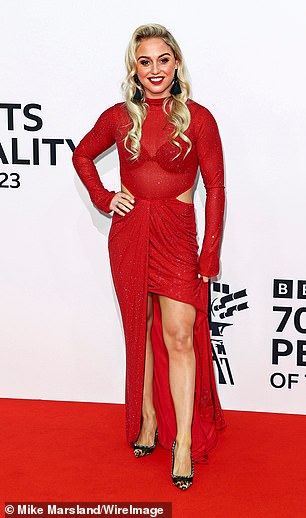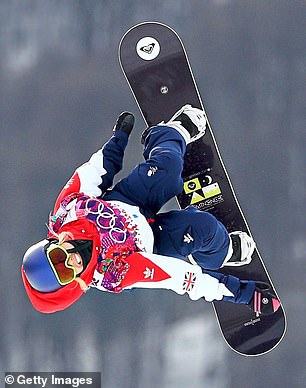Aimee Fuller in action during the 2014 Winter Olympics in Sochi
Aimee Fuller is a former professional snowboarder who represented Great Britain at the 2014 and 2018 Winter Olympics. She also placed third in the world in Big Air, a high jump event with a high risk of injury, in 2017, writes Peter Robertson.
The 33-year-old is now a presenter, author and host of the Monday Mile podcast, where she talks to athletes about where they find their motivation. She is the first female running reporter for the BBC’s Great North Run and has appeared on Channel 4’s reality show Celebrity Hunted.
Aimee was born in Farnborough, Kent, but also grew up in the United States and Northern Ireland. She currently lives in West London.
What did your parents teach you about money?
My parents taught me not to be stingy. Being stingy is something I hate. I believe in investment and that what you invest will be recovered over time thanks to the lack of attachment.
My younger brother, Josh Fuller, is an entrepreneur and has taught me a lot. He started out as a barber and ran a mobile salon out of a Mercedes Sprinter van. He now works exclusively in real estate with his own business, Fuller Homes, and has advised me on investments.
What was your first salary?
I got my first professional snowboarding contract at 17 for £13,000, which at the time seemed like it would change my life, and it did.
It was the beginning of my career and I learned how to travel the world on a budget in my first few years as a full-time athlete.
I was proud to earn my own money through my profession, which I loved. That same season I won $5,000 in an event. Everything I earned during the first two or three years I reinvested directly into the sport.
Have you ever had trouble making ends meet?
Yes. It is difficult to travel around the world in the first years of your career.
Cheryl Maas, a great friend from the Netherlands, a three-time Olympian and role model, convinced me to travel to Austria to compete alongside her. At the time, I only had £500 in the bank and nowhere to stay.
She had faith in my ability and invited me to accompany her in her rental car to the event on the Dachstein Glacier.
It was that event that pushed me to continue my career and I took home the win at the first event of the season, the World Tour Pleasure Jam. The prize money was small, $3,000, but it put my name on the map and opened the door to more sponsorships.
How much did it cost to start snowboarding?
It’s not a cheap sport. A quality snowboard costs between £300 and £800, but when you’re starting out on a dry slope, it’s affordable and not expensive.
When you perfect your technique, you have to go abroad to reach higher levels like the rest of the European runners.
How does participating in the Olympic Games help financially?
I didn’t get paid to compete in the Olympics, but you can receive incentives from sponsors if you win a medal.
The Olympics are a huge vehicle for getting your profile out there. It’s almost like a degree for athletes, and over the four-year cycles you learn a lot about marketing, world travel and how to position yourself in the media.
For me, it attracted bigger sponsors like Jeep and Red Bull, which allows you to practice your profession at the highest level.
How costly are injuries for a snowboarder?

Off-piste: Aimee at the BBC Sports Personality of the Year event
Injuries take you out of action, and a sport like snowboarding is constantly progressing, so there is no time to be out of action. I was very lucky and only suffered a number of injuries that I would consider minor compared to those of other competitors.
I broke my eye socket, fractured my tailbone, broken ribs and collarbone, suffered a grade 2 sprain to the lateral ligament of my ankle and a shoulder joint.
The most common injuries in snowboarding are knee injuries. If you tear your ACL, you could miss the entire winter.
Have you ever been paid an absurd amount of money?
Yes, I was paid six figures to film a TV commercial that took only one day.
What’s the most expensive thing you’ve ever bought for fun?
My car, an electric blue Porsche Macan or a Rolex, but I see watches as an investment.
I bought my first watch years ago at Heathrow. It’s a Rolex GMT and I’ve kept it in the box. I’ve been adding to my collection ever since.
The best financial decision you’ve ever made?
Investing in Belfast City Centre Property. Up and coming area in Ravenhill.
What is your biggest financial mistake?
Investing in Bitcoin based on other people’s advice.
I have since learned not to invest in anything unless you have done your research or are genuinely interested. I lost £3000 almost instantly. Since then I have stuck to my watches.
Do you have a pension?
No. I have decided to invest my money as I go.
Do you own any property?
Yes, I have four houses, all of which I rent out. I am a big proponent of bricks and mortar. I live in a two-bedroom flat in West London.
Do you donate money to charities?
I have supported many charity campaigns including hosting an advertising campaign after Channel 4’s Celebrity Hunted programme for Stand Up To Cancer, for the Cancer Rethink Reuse Research campaign.
I also donate my snowboards and Olympic memorabilia to raffles for cancer research.
It’s a charity that is close to my heart. In 2008, I lost my paternal grandfather to cancer.
He was a great inspiration and played an important role in shaping my entrepreneurial attitude.
As children, he took us to flea markets and we learned how to buy and sell. He taught us the value of money. He was a great supporter of my sport and championed everything I did – from motocross, when I was six, to gymnastics and basketball. He would have loved to see my Olympic career.
What would you have done if the approach and transmission had not worked?
I am fascinated by the weather. Last year I appeared in a Tampax TV advert, reading the ‘Flow Forecast’ with the aim of removing the period taboo, and I loved it. I have always wanted to be a meteorologist. This ties in with my status as a professional athlete who constantly checks the forecast. There is a real intrigue and interest in weather fronts and how our climate works.
What is your number 1 financial priority?
Having the financial security and freedom that allows me to travel and always be present in this beautiful world.
Some links in this article may be affiliate links. If you click on them we may earn a small commission. This helps us fund This Is Money and keep it free to use. We do not write articles to promote products. We do not allow any commercial relationships to affect our editorial independence.

